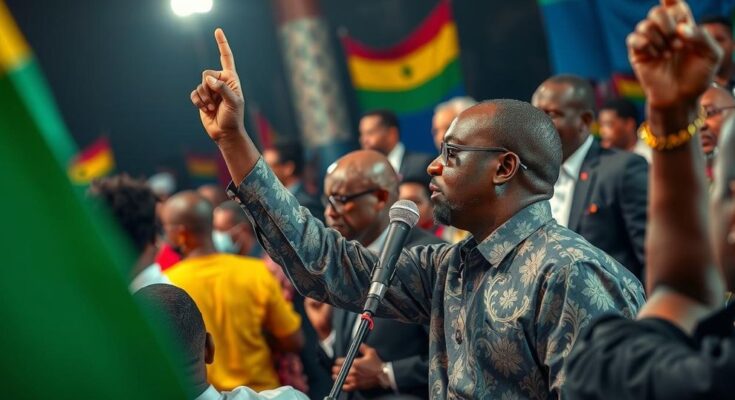Ghana’s upcoming elections reveal a troubling trend as leading candidates promise to intensify anti-LGBTQ+ legislation amid pervasive societal hostility. With significant penalties for LGBTQ+ identity and activities proposed in a controversial bill, the community faces potential marginalization and increased violence. The Supreme Court’s impending decision will shape the future landscape for LGBTQ+ rights in Ghana, following a widespread call for legislative support from conservative and religious factions.
In the lead-up to Ghana’s general elections on December 7, the nation’s LGBTQ+ community finds itself in a profoundly precarious situation as top presidential candidates declare their intentions to enhance anti-LGBTQ+ legislation. The impending legislation threatens to impose severe penalties, including imprisonment, on individuals identifying as LGBTQ+ and criminalizes aiding or associating with them. Candidates such as ruling party candidate Mahamudu Bawumia openly promise to sign this bill into law, while his opponent, John Dramani Mahama, advocates for stricter enforcement of existing laws.
As societal attitudes in Ghana lean heavily toward hostility against LGBTQ+ individuals, the proposed law has further exacerbated these sentiments. The bill, which seeks to impose up to five years of imprisonment for certain same-sex activities and holds non-reporting friends and family accountable, reflects the ingrained homophobia within the public. Following public mobilization led by religious groups — against same-sex relationships — the bill has gained traction, leading advocates to fear an increase in violence and discrimination against LGBTQ+ persons.
Human rights advocates have articulated that the legislation not only heightens the prevalent stigma against LGBTQ+ individuals but also creates an environment ripe for persecution. Many in the community, including individuals like Abena, express feelings of exclusion and insecurity regarding their futures under such a potential regime. With the Supreme Court scheduled to address the bill’s constitutionality shortly after the elections, these individuals are left grappling with their voting choices amid a political landscape that largely leverages anti-LGBTQ+ sentiments for electoral gain.
The international community, particularly the European Union, has condemned such legislative measures and warned that enacting the bill could jeopardize Ghana’s human rights obligations and foreign aid. Ultimately, the outcome of the elections and subsequent judicial rulings may drastically alter the landscape of rights and safety for LGBTQ+ individuals in Ghana, with dire implications for personal freedom, safety, and social acceptance.
In Ghana, political candidates exploit pervasive anti-LGBTQ+ sentiments to secure votes, with both ruling and opposition parties promising to strengthen anti-LGBTQ+ laws ahead of the upcoming elections. A controversial and repressive bill that seeks to broaden the definition of criminalized actions relating to homosexuality has stirred widespread concern, particularly among human rights organizations. The nation, characterized by religious conservatism, has a long history of criminalizing LGBTQ+ identities, and the proposed legislation threatens to exacerbate persecution against sexual and gender minorities. Historically, public attitudes remain staunchly opposed to LGBTQ+ individuals, as evidenced by recent surveys reflecting a lack of social tolerance. The implications of the bill reach far beyond legal penalties, fostering an environment where societal violence against LGBTQ+ persons may flourish. Amid this backdrop, individuals seeking basic rights and recognition face daunting challenges in a politically charged atmosphere where their identities are wielded as tools for political capital.
In summary, the mounting anti-LGBTQ+ rhetoric and proposed legislation in Ghana place the LGBTQ+ community in a precarious situation as they approach the imminent general elections. Candidates are leveraging widespread societal prejudices to galvanize support while threatening to further entrench discriminatory laws. The outcomes of both the elections and the Supreme Court decision on the legislation will have profound and potentially devastating repercussions for the rights and safety of LGBTQ+ individuals in the country, as well as broader implications for international relations and human rights commitments.
Original Source: www.voanews.com



